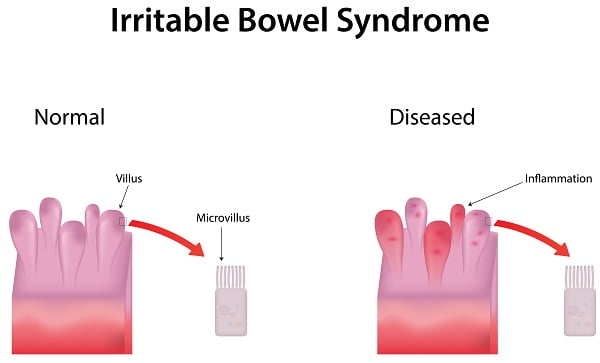What You Should Know About Irritable Bowel Syndrome?
- Updated on: May 30, 2024
- 3 min Read
- Published on Apr 19, 2021

What is Irritable bowel syndrome (IBS)?
Irritable bowel syndrome is a type of gastrointestinal disorder which changes the function of digestive system. IBS mainly affects the large intestine which leads to abdominal pain and a change in the pattern of the bowel movement. Due to changing pattern of bowel movement, the person suffers from either diarrhea or constipation.
IBS develops for a lifetime and one can only cure the symptoms related to it. IBS is also known as functional bowel syndrome, irritable colon, spastic colon and spastic bowel. The main cause of the IBS is yet not clear. Theoretically, it is believed that IBS is a combination of abnormal gastrointestinal tract movement and also a disruption in the gut brain axis.

It may be triggered in one’s body due to intestinal infection. Stress in daily life is also a factor for the onset of IBS.
Data shows that about 10-15% of people in the developed world are affected by IBS. The disease is more common in South America and women are mostly affected by it than men. It develops between 20-30 years of age.
IBS does not cause any threat to life expectancy. It just affects the normal routine of a person. A person can experience abdominal pain which affects the activities of his daily life.
What are the different types of irritable bowel syndrome?
IBS has been classified into four different types:
- IBS-D – diarrhea is common in it
- IBS-C – constipation is common in it
- IBS-M – both diarrhea and constipation are common
- IBS-U – neither occurs very often
What are the signs and symptoms of Irritable bowel syndrome?
People suffering from IBS have symptoms like:
- Diarrhea
- Constipation
- Constipation alternating with diarrhea
- Abdominal pain
- Bloating
- Whitish mucus in stool
- Increased gas
- Weight loss
- Loss of appetite
- Nausea
- Headache
- Backache
- Depression
- Anxiety
What are the various causes of Irritable bowel syndrome?
The cause of IBS has not yet been identified completely, but it is believed that a combination of various problems causes IBS.
- Physical problems
- Mental health problems
Which physical problems can cause Irritable bowel syndrome?
- Brain-gut signal problem – signals between the brain and the nerves of gut control the functioning of gut. If any problem occurs in these signals then there is a chance of the onset of IBS
- Gastro-intestinal motility problem – people suffering from IBS do not experience normal motility of the colon. Slow motility can lead to constipation whereas fast motility can lead to diarrhea
- Pain sensitivity – in IBS, the nerves of the gut become sensitive causing more pain or discomfort
- Infections – a bacterial infection in the gastro-intestinal tract may cause IBS. The reason behind this is still unknown
- Small intestinal bacterial growth – in our small intestine, few bacteria are found but when there is an overgrowth or increase in the number, these bacteria can produce extra gas and may cause diarrhea
- Neurotransmitters – people suffering from IBS experience a change in the level of neurotransmitters
- Genetics – studies have shown that IBS is more common in people with family members who have a history of GI problems
- Food sensitivity – it has been reported that foods rich in carbohydrates, fatty foods, alcohol triggers the symptoms of IBS.
Which mental health problems can cause irritable bowel syndrome?
Panic disorder, anxiety, depression are common in people suffering from IBS but the link between mental health and IBS is still not clear.
How do physicians diagnose irritable bowel syndrome?
There is no specific laboratory test to diagnose irritable bowel syndrome. Ruling out method is used in which conditions that produce IBS like symptoms are excluded.
Ruling out parasitic infections, lactose intolerance, small intestinal bacterial overgrowth is recommended for all patients before a diagnosis of IBS is made.
Certain tests are also done to decide whether the patient is suffering from IBS or not. These are:
- Flexible sigmoidoscopy or colonoscopy to look for signs of blockage in intestine
- Upper endoscopy if the patient is suffering from heartburn or indigestion
- X-rays
- Blood tests to look for anemia, thyroid problems (such as hyperthyroidism)
- Stool tests
- Various tests for lactose intolerance, gluten allergy, celiac disease
What is the treatment of irritable bowel syndrome?
Since a person suffers from different symptoms in IBS, there is no single treatment that works for everyone. Many things can trigger IBS symptoms.
One may need to make certain changes in their diet:
- Avoid caffeine
- More intake of fiber containing containing food like fruits, vegetables, whole grains
- More intake of water
- Smoking should be avoided
What medications do doctors prescribe for the treatment and management of the disease – irritable bowel syndrome?
Following drugs are used to treat IBS:
- ANTIPASMODICS – it can control colon muscle spasm
- ANTIDIARRHEAL DRUGS such as IMODIUM
- LAXATIVES can give relief from constipation
- ANTIDEPRESSANTS may help relieve some symptoms












